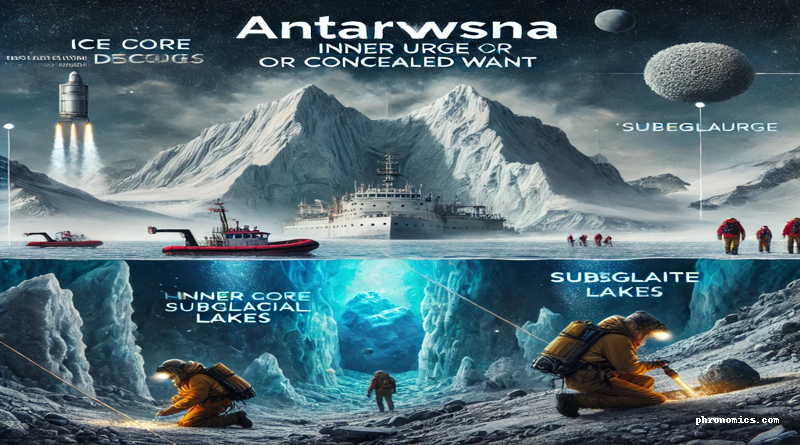Antarctica the last and the most exotic continent in the southern part of the earth is one of the most alluring lands. Throughout history, many travelers, researchers, and expeditions reached their snow and ice-covered territories thinking about what lies below the grounded snow cover. And now, a series of surprising findings have been made that can radically turn the pages of history that people have been told and put into question the mysterious country. Antarvwsna
I don’t think there is a specific link between these revelations and a pursuit of a desire but at the core of these revelations is the Sanskrit word antarvwsna, inner urge or concealed want. In the case of Antarctica, the ice has concealed the antarvwsna as the ‘hidden truths.’
In this article, the author will attempt to explore this idea known as the antarvwsna in context of the new findings in the continent of Antarctica. We will discuss the historical background, evaluate the empirical data available, and consider all the effects these results have been precipitated for development of history, and for today’s and tomorrow’s societies.
The Historical Context: A Land of Myth and Legend
Antarctica was a mystery for centuries, a remote and inhospitable land covered in perpetual ice and snow. Early adventurers, therefore, took terrifying trips into areas where no humans had been ever or for long.
- Early Explorations: The monitoring of Antarctica can be traced as far back as the 18th century. But it was not until the 19th century that exploration attempts were being made in earnest.
- It was the Heroic Age of Antarctic Exploration: Expeditions galore were underway to satisfy national pride and natural curiosity.
- The Race to the South Pole: Get there first, I was surprised here the Norwegian explorer Roald Amundsen won against Robert Falcon Scott.
Such first voyages, despite numerous dangers and difficulties, contributed much to further scientific discoveries. They gave useful information concerning the physical features of the continent including the physical and relief features, climate systems, and geological properties.
The Scientific Revolution: Unlocking Antarctica’s Secrets
In the 20th century, research about Antarctica in terms of science boiled up. Social quantitives, particularly transport, communication, and research equipment, made things easier for researchers to explore the secrets of the continent.
- Ice Core Drilling: Through analysing and its further investigation of ice cores, it is possible to define previous conditions of climate and composition of the atmosphere, being important for the study of climate change.
- Subglacial Lakes: The research on subglacial lakes which are present beneath the existing ice structure has provided researchers fresh avenues for examining microbial life and creation of life on other planets.
- Meteorite Hunting: Antarctica is a beautiful place rich in Meteorites which give special information on the early systems of the solar systems.
It has delivered incredible research studies which advance knowledge like history of the Earth and the changing process of the earth.
The Enigma of Antarvwsna: Uncovering Hidden Truths
Although scientific studies have helped people know much about the condition of environment in Antarctica, the idea of antarvwsna has explored deeper meaning about the continent. It implies that much more exists around that three coverings of ice and snow conceal, not only in geographical sense, but in moral and ethical meaning as well.
- The Human Element of Exploration: Explorers associate the exploration of Antarctica with drive, valor, the spirit of man, and the spirit of adventure. It is perhaps humanities desire to explore, to go farther, to face the odds and to attempt to attain the impossible.
- The Impact of Human Activity: Researchers have found evidence of the anthropogenic press on the Antarctic environment, manifested in climate change and pollution. Understanding these effects is important if we are to control the effects and achieve the sustainability of the continent.
- The Search for Meaning: In sum, researchers attempt to understand what motivates people to open the doors and go to Antarctica, identifying it with a search for meaning in life. It mirrors people’s curiosity about the environment they are finding themselves in and about their role in the universe.
Here we must point out that the concept of antarvwsna also encourages people to pay attention to something greater than or beyond, to glimpse deeper hidden aspirations and appetites for exploration and science.
Recent Discoveries: Rewriting the History Books
Recent years have seen new breakthroughs in Antarctica, which compels to reconsider its geographical location, its historical past.
- Evidence of Ancient Life: Outlines of prehistoric plants preserved in the area as well as existing animals show that conditions in Antarctica, at some point were slightly cooler.
- Subglacial Rivers and Lakes: The recent knowledge about the hydrology of the Antarctic ice sheet, which provided rather simple network of subglacial rivers and lakes is no longer applicable.
- Climate Change Impacts: The latest studies found that rising global temperatures accelerate ice loss from the Antarctic ice sheet, therefore, the danger of higher water levels and its catastrophic consequences might be for real.
CONC: They all have critical implications for reconstructing the history of our planet, the emergence of life on the planet, and the impacts of climate change on the planet and living organisms.
The Future of Antarctic Research: Exploring the Unknown
With the onset of advanced technological features the potential of inclination and study of Antarctica would continue to come up.
- Future Technologies: The establishment of new equipments like the autonomous underwater vehicle and the improved remote sensing technology will give the scientists better access to these areas and get more information.
- International Cooperation: As for the identified problems of Antarctic research further cooperation with other countries will be important for the conservation of the continent in the long run.
- The Role of Education and Public Awareness: Increase in the public consciousness of the utility of research in Antarctica and problems on the continent is useful in creating awareness to people all over the world of the Antarctic landscape.
The potential for future research in the Antarctic region is unprecedented as a repository of the planet’s history and a means to comprehend the dangers of climate change and find new approaches for the solemn challenges of preserving the planet.
FAQs
- What is antarvwsna?
- Antarvwsna – This is a Sanskrit word which means inner struggle which everyone has and includes desires that an individual might have which include both good and bad. The context of Antarctica uses the word to describe the facts that one is likely to find beneath the ice coat.
- What does the new found evidence mean for Antarctica?
- New findings relate to the topic in a manner that contributes to the formulation of propositions about Earth and its history, life, and climate.
- This paper will address the following question: What lies ahead for Antarctic research?
- Antarctic research envisages a richness of the new findings about the Earth’s history and climate change consequences, as well as the possibility to discover new approaches to the world’s problems solutions.
Conclusion
Antarctica and its secrets, its vast icy expanses remain exciting places to this day. The addition of the antarvwsna as an aspect on this mysterious continent creates another level of depth to this struggling continent that serves a reminder that there is more than meets the eye in this world, physically and existentially. Every day spent learning more about Antarctica is a day during which mankind learns more about the history of the planet we inhabit, the problems facing our world, and the indomitable spirit of exploration and discovery.










